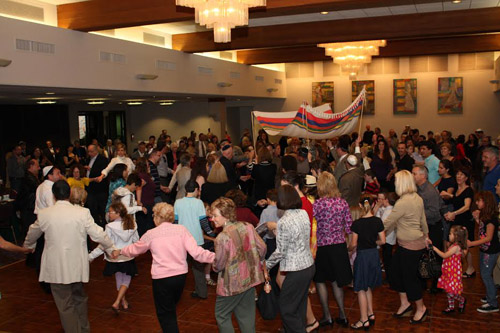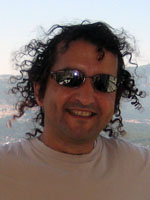
By David Ogul

SAN DIEGO – At a time when fewer American Jews call themselves religious, and when even fewer are attending services regularly, a series of bold initiatives at Tifereth Israel Synagogue has led to a thriving membership and growing programs.
The synagogue’s strategies have drawn notice from congregations throughout the nation who are eager to replicate the success that includes a 10 percent boost in membership since last summer, a doubling of enrollment at the affiliated Silverman Preschool, and a steady growth in the number of students studying at the synagogue’s Abraham Ratner Torah School.
“Our members are proving that Conservative Judaism is alive and well in San Diego County,” said Jerry Hermes, president of the congregation’s Board of Directors.
The synagogue in the San Carlos section of San Diego also is marketing itself to community groups. Navajo Community Planners, Inc., a city-sanctioned organization that advises the San Diego Planning Commission and City Council, recently moved its regular public meetings to the Cohen Social Hall at the Tifereth Israel campus on Cowles Mountain Boulevard. A San Diego County-run exercise class for middle-aged and older adults has seen steady growth since it began operating at the site this past spring. And the non-denominational Tifereth Israel Community Orchestra, headed by music director David Amos – who has conducted the London Symphony and Israel Philharmonic among other professional orchestras around the world – continues to draw large crowds after a quarter century of being based at the synagogue.
The synagogue also is home to regular visits from religious study students at local colleges and universities who are eager to learn more about Judaism.
The most profound change came last summer when Tifereth Israel broke the mold in local synagogue financing by eliminating mandatory membership dues and asking congregants to donate what they could and what they would. The new model is aptly named T’rumah, a reference to Exodus 25:1 to 27:19, which explains how the Israelites built the Tabernacle through voluntary donations.
“When it came time to build the Mishkan, the tent-sanctuary in which the Israelites worshiped in the Sinai desert, every Israelite was expected to bring a freewill offering of their own choosing to build the sanctuary – but God did not say how much,” noted Rabbi Leonard Rosenthal. “God knew that because of the Israelites’ love of their faith and tradition, they would be as generous as possible.”
Tifereth Israel offers donation advisory guidelines based on a transparent process in which annual expenses are determined during the budget process. Then it is up to congregants to decide what to give.
The change brought about an immediate increase in new membership.
“No Jew who wants to join our congregation will ever again feel daunted by the financial process inherent with the old system of fixed dues that can be difficult to afford for struggling families and young adults,” Hermes said. “We were hoping that Jews who were looking for a stress-free and open synagogue experience would give us a long look, and we’ve been very pleased with the results.”
Eliminating mandatory dues drew strong media coverage when the new model took effect. Today, it is drawing strong interest from other congregations in the county.
In May, meanwhile, the synagogue’s Silverman Preschool officially dedicated the Dr. Kenneth Ginsburg Infant Care Center, an addition that enables the rapidly expanding preschool to accommodate newborns and infants of working parents.
“There are so many working parents looking for good, quality daycare for their children, and this new addition enables Silverman Preschool to meet that growing community demand,” said preschool Director Amy Stanley.
The changes come at trying time for synagogues across the country. According to a 2013 Pew Research Center report, 1 in 5 Jews in America now describe themselves as having no religion, are less likely to say that they attend religious services weekly or that they believe in God with absolute certainty.
Despite these changes in Jewish identity in America, 94 percent of U.S. Jews said they are proud to be Jewish, and three-quarters said they have a strong sense of belonging to the Jewish people. Tifereth Israel has built upon that bond in expanding its services and growing its membership.
More than 340 families, comprising nearly 600 people, are members of the synagogue, which was founded in 1905 and remains one of the larger Conservative congregations in the region.
Tifereth Israel Synagogue is at 6660 Cowles Mountain Boulevard.
*
Ogul, a freelance writer, is an active member and officer of Tifereth Israel Synagogue. You may comment to him at david.ogul@sdjewishworld.com, or post your comment on this website provided that the rules below are observed.
__________________________________________________________________
Your comment should be followed with this information: Your full name, your city and state (or country) of residence. Letters lacking such information will be automatically deleted. San Diego Jewish World is intended as a forum for the entire Jewish community, whatever your political leanings. Letters may be posted below provided they are responsive to the article to which they are affixed, and civil in their tone. Ad hominem attacks against any religion, country, gender, race, sexual orientation, or physical disability will not be considered for publication. There is a limit of one letter per writer on any given day.
__________________________________________________________________
This just shows flaws in the whole concept of synagogue as center of Jewish life. There is no mitzvah to formally join a congregation with or without dues. There is only a requirement to pray with a minyan, be it in a synagogue, basement, office conference room, or outdoors. To study and learn about Judaism does not require a synagogue. Only books, a tutor or private teacher, or a study partner. For Jews to marry or be buried does not halakhically not require a synagogue, or even a rabbi. To be bar mitzvahed does not require a synagogue or even a rabbi, only a minyan for torah reading. While synagogues provide a convenient place for all of the above, to practice Judaism simply does not require emulating other religions in building and financing expensive buildings and staffs that are used vastly under capacity most of the time.
Robert Schwartzman
Washington, DC